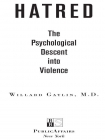Hatred by Willard Gaylin (best manga ereader txt) 📗

- Author: Willard Gaylin
Book online «Hatred by Willard Gaylin (best manga ereader txt) 📗». Author Willard Gaylin
On December 7, 1993, Colin Ferguson boarded the 5:33 P.M. commuter train to Hicksville, Long Island, pumped thirty rounds of ammunition and sprayed his fellow commuters, managing to kill six people and wound nineteen others. The mayhem was limited only because a heroic passenger overcame him before he could reload. The ever-imaginative defense lawyer, Ron Kuby, a colleague of William Kunstler, decided that his plea of not guilty could be supported by the fact that Ferguson was suffering from “black rage.” What is black rage? Well you might ask. It turns out that it is some “malignant psychological state” black people endure by dint of being raised in a white racist society.
What a blessing that most black Americans living in the United States have not developed this maddening psychological condition that drives one to mass murder. At the risk of being a spoil-sport, let me mention that Colin Ferguson was raised as an affluent member of the decidedly black culture of Jamaica. There he suffered the indignities of being chauffeured back and forth in an expensive limousine from his expensive home to his expensive private school.
Even Colin Ferguson seemed offended by this defense. He refused to use the plea, firing his lawyers instead. Still, the “black rage” defense lives on. It has been used in many courtrooms to explain and thus exculpate not only gratuitous black violence against whites but also black crimes against Hispanics, Indians, Koreans, and assorted other minority groups.
Not to be outdone, defense attorney Erik M. Sears introduced the equally compelling diagnostic category, “early Arab trauma,” in defense of his client, Rashid Baz. In March 1994, Baz had opened fire with an automatic weapon on a group of children on their way to a yeshiva. This was no impulsive maneuver. Baz planted himself on the Brooklyn Bridge, carefully timing the arrival of the bus. Because he was shooting at a moving target, he was able to kill only one student, sixteen-year-old Aaron Halberstam, but he managed to seriously wound three others.
Attorney Sears—lacking any serious defense for this premeditated slaughter of the innocents—emulated Kunstler and Kuby and proclaimed his client the victim. Baz had spent the first eighteen years of his life in Lebanon. He could not possibly be held responsible for this murder. He had been so psychologically scarred by the larger environment of his youth that he had no more understanding or control over his behavior “than a fire once lit understands why it’s burning.” All that was necessary was to locate an expert witness to lend scientific credibility to the defense. He had no trouble locating Nuha Abuddabeh, a Ph.D. in psychology, a practicing clinician, and the hostess of her own talk show, no less. It was she who introduced the disease “early Arab trauma” into the lexicon of psychologically exculpating conditions.
Logically, this disease would seem to exculpate all people who were raised in an Arab culture for the first eighteen years of their lives from criminal charges of murder. If so, it could equally be grounds for banning this population—psychically incapable of controlling their murderous rage—from entering the country. While denigrating these defenses as ludicrous, I acknowledge both Ferguson and Baz to be “sick” people. But common people using common sense will almost inevitably convict them in a courtroom. And they should.
All “mental illness” cannot be a free ticket to exoneration. “To understand all is to forgive all” is not an operative principle except in the psychiatrist’s office—in the context of medicine—where the patient is granted certain special privileges and understanding. Inherent in the definition of the “sick role” is the principle of nonculpability. The sick person is a victim, not a criminal. He is not to be held responsible and punished for his illness, whether that illness is typhoid fever, which can infect others and kill them, or schizophrenia, which can also produce behavior that kills others. That is all true in the sick room. But not in the courtroom and, for that matter, not in the mind of the ordinary person.
Unfortunately, at the same time that psychiatrists were continuing to defend the nonculpability inherent in the sick role, psychiatry was vastly expanding the definition of mental illness. The population of those with some symptoms of mental illness came to include the majority. Still, the courts, in order to secure a society of law, had to defend the idea of a populace acting voluntarily and freely, therefore responsible for their actions. How could the courts do that, when almost everybody was now assumed to be a little sick?
When confronted with this dangerous contradiction in definition and purpose, two distinguished students of human behavior articulated two opposing, and equally unmanageable, solutions. One decided that there was no such thing as mental illness. And the other announced that there was no such thing as human freedom.
In 1961 Thomas Szasz published his immensely influential book, The Myth of Mental Illness, and became a hero of both the libertarian Right and the libertarian Left, who shared his anti-authoritarian and antiestablishment sentiments. In this book, as the title suggests, Szasz denied the very existence of a population of the mentally ill.
The 1960s was a period that chose to romanticize the insane as saner than the rest of us, as demonstrated in such movies as The King of Hearts and One Flew over the Cuckoo’s Nest. It took a long time for the liberal supporters of Szasz to realize that if you deny the validity of mental illness, the only proper place for a schizophrenic man dangerous to others was a prison—as Szasz, himself, would state.
At the other extreme was the brilliant psychologist B. F. Skinner. In his influential book Beyond Freedom and Dignity, published in 1971, Skinner denied the very existence of freedom, thus any voluntary action. In his image of human behavior, the adult is tied to his past by connecting bonds





Comments (0)